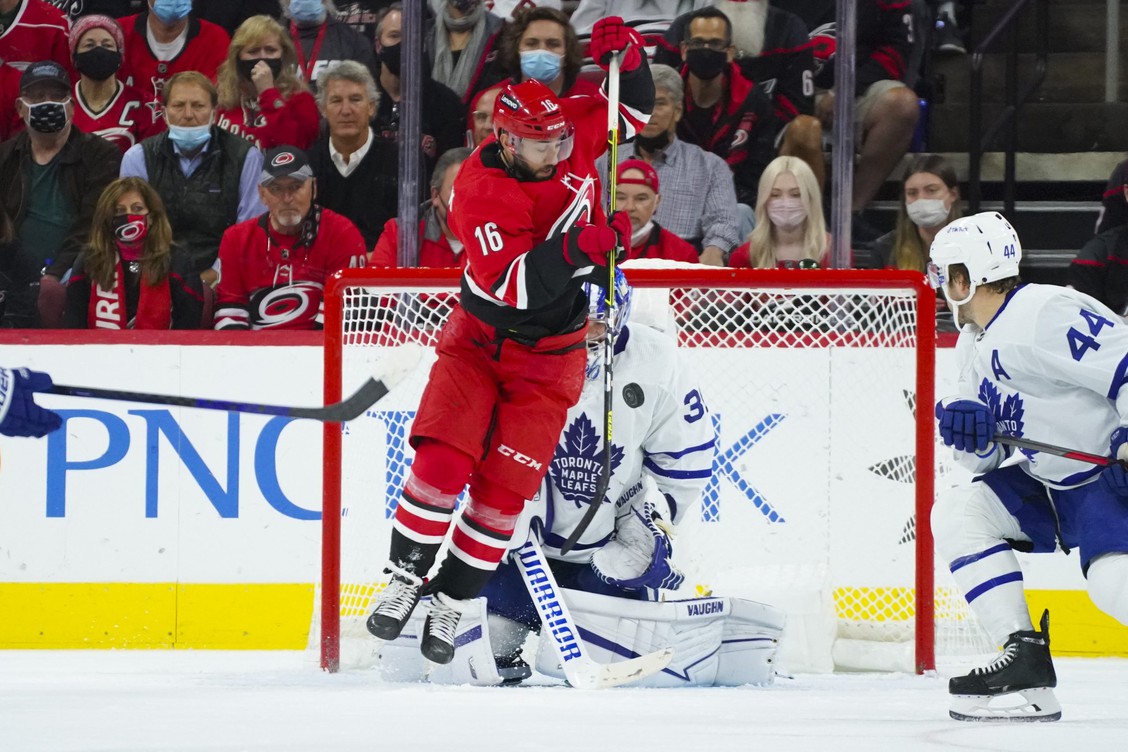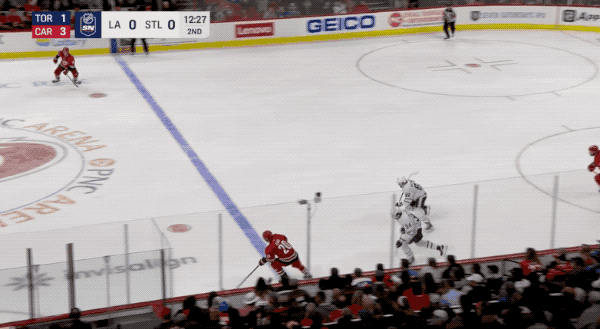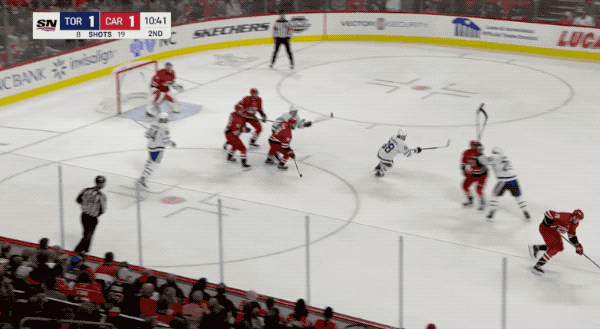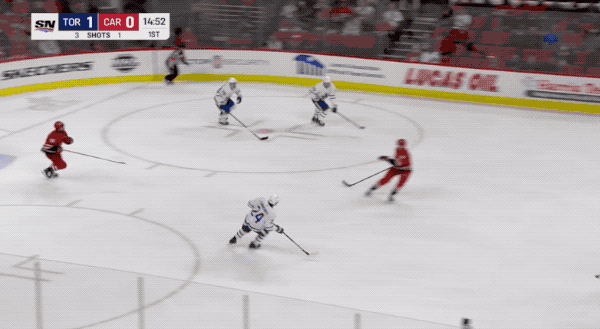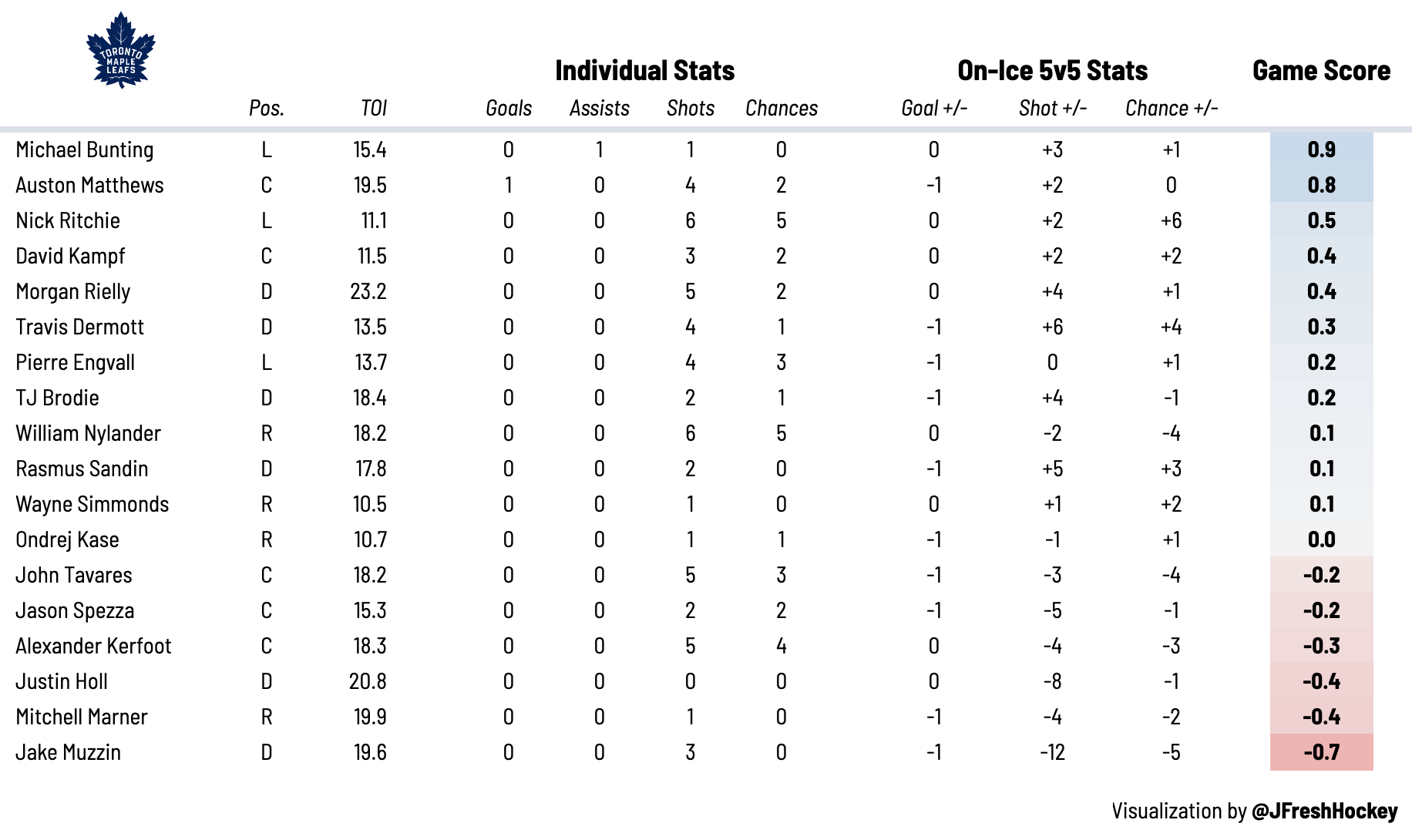Oh, the joys of watching the Toronto Maple Leafs.
Sometimes diving deeper into the data doesn’t help me arrive at a better understanding of this sport. After watching Toronto’s 4-1 loss last night, I started digging into every stat I could find to help explain what’s happening with this team right now. I then rewatched some video hoping it would help.
It didn’t.
Emotionally, I’m frustrated right now, as are many. Rationally, I’d like to think we can arrive at a few answers for Toronto’s struggles lately. Unfortunately, none of them are great if you have a rooting interest in the Leafs.
The highly-paid veteran defensemen in their 30s are playing below average hockey at even strength through seven games. The very highly paid winger has failed to generate any offense lately, even though the analytics angel (or devil) on my shoulder is telling me his on-ice shooting percentage of zero is unlikely to continue. A successful zone entry or two might help, though.
Frankly, I’m tired of the conversation surrounding Mitch Marner right now and would just like to see him play better so we can stop talking about him. It’s not going to happen, even if he does eventually regress back to the 90-point pace we all expect him to be on, so maybe that’s another aspect of this season I need to accept.
The Carolina Hurricanes are the best team the Leafs have played in well over a year, so maybe this type of result should have been more predictable. Personally, I find the excuses we tend to make for this Toronto team exhausting, even though I know I’m going to convince myself there are positive indicators for future success.
It’s what I need to do to get through these types of nights. What’s your process?
It’s time for some report cards.
4 Stars
Nik Ritchie (LW, #20) — There aren’t too many positives to take out of last night. One exception is Nick Ritchie, who played his best game of the regular season by far, reminding us more of the power forward we saw drive the net in the preseason and pick up a few goals from the blue paint.
Those are the types of plays you expect Ritchie to make, driving to the net at 235 pounds with his stick on the ice. The puck didn’t cross the goal line last night, but he was getting chances from areas where you’d expect him to thrive on a team with passers named Marner, Nylander, and Spezza, who found him in the high-danger spots.
It’s hard ice to come by against Carolina, so I have to give Ritchie credit for looking more like a $2.5 million forward last night. A lot of us would love for him to play like this with more consistency.
3 Stars
Jack Campbell (G, #36) — This game shouldn’t have been as close as it was for the first 25 minutes of the game. The dam eventually broke in the second period, with three quick ones getting past Campbell. There’s a five-hole goal he’ll want back there, but for the most part, he’s the reason Toronto stayed in the game as long as they did.
Soupy bailed the Leafs out of a few bad situations defensively. If we’re stretching for positives, starting goaltending is not the reason Toronto lost the game last night.
Michael Bunting and William Nylander — Both of these forwards have had great seasons and played well again last night.
They couldn’t be more different as players, which is what makes them such great complements in my opinion. It reminds me of Zach Hyman alongside Nylander in their rookie and sophomore seasons. The skilled player carries the puck in transition, while the hard-nosed puck retriever wreaks havoc in the dirty areas of the ice.
We don’t have the greatest public measures on forechecking impact right now, but I’d love to know how Bunting compares to young Hyman in that regard. Is he disrupting as many breakouts? Improving his line’s ability to win the puck back?
He’s nowhere near the player Hyman has developed into, but I still love Bunting’s value on that $950,000 contract over the next few years.
To wrap up Nylander’s game, he dropped his shoulder a few times in one-on-one battles, which was great to see. He also did what he does best: gain the zone in transition.
If he can swing back and slice through a defense at 5v5, why not let him do it at 5v4?
Rasmus Sandin (LD, #38) — Let’s start with the bad. And we’re talking really bad.
Losing one-on-one battles against more physical competition is what scares coaches from playing high-end puck-movers like Sandin against the opposition’s best players. When Andrei Svechnikov bulldozes him in front of the net — and the referees conveniently go into playoff mode of neglecting the rulebook — it scares NHL coaches from trusting that type of player defensively in the key moment of a playoff game.
My counterargument is the value he’s providing offensively.
Last night, the Leafs dominated play when Sandin was on the ice. We might as well include his partner, Travis Dermott, in this section, who played well. The Leafs were on the right side of center ice with these two on the ice, and Dermott’s plays where he shrinks the rink by stepping up and forcing the opponent to give up the puck are no accident in that.
If we’re being honest, though, Sandin’s upside as a puck mover is something tantalizing far beyond Dermott’s potential. It’s why I ask if Sandin’s the player you trust manning the point in a 6-on-5 situation — as you should because of his ability to complete the next pass — then shouldn’t you be playing him more minutes at 5v5?
Sandin was +5 in shots and +3 in chances last night. He’s +43 and +27 this season at 5v5. I think it’s safe to say he’s succeeding in these minutes, the odd growing pain aside.
2 Stars
Auston Matthews (C, #34) — For almost any other player on the planet, this was a good NHL game. One goal, a couple of chances, my line actually played solid 5v5 hockey while the rest of my team got filled in — go me!
When it’s Auston Matthews, though, you expect him to make more special plays offensively. We’ve seen him generate more chances than he did last night. It’s also worth mentioning Frederik Andersen should have stopped that wrap-around attempt, but maybe that’s a thing between BFFs.
Who’s to say?
Alex Kerfoot (LW, #15) — Few players confuse me more than this man. He made a few nice passes last night in the offensive zone that got John Tavares into a great shooting position. One of those chances even hit the post.
Then there are plays where he’s skating himself into bad ice in the neutral zone and I’m wondering what he’s trying to accomplish in transition. For a skater with his speed, you’d think he’d be able to accomplish much more off the rush. He isn’t, then he often turns the puck over unnecessarily and is forced to play defense for the rest of the shift.
His line spent more time on defense than on offense last night, which has been the trend all season. In fact, he’s the only Toronto forward getting outshot at 5v5 this year. It was also the trend for 56 games last season, even though seven games convinced many NHL General Managers that he was a valuable NHL forward.
Jared McCann has 6 points in 6 games tbh
— Todd Leigh Offside (@Totally_Offside) October 26, 2021
Isn’t that interesting?
David Kampf (C, #64) — My read on Kampf is the same as it ever was: Low-event center who wins faceoffs and kills penalties, but don’t expect any offense from him. The fact that Sheldon Keefe and company are expecting more offense from him is concerning to me. This is who he’s always been as a player.
As a side-note, you know what’s not good defense? Taking a penalty when you’re down two and pressing with 10 minutes left in the game. I love how long and rangy Kampf is defensively. He reminds me of an NBA wing defender swallowing up large chunks of space on defense. That was just a really frustrating moment in a high-momentum moment of a frustrating game.
Morgan Rielly (LD, #44) — Defensively, this was the type of night that gives me pause about the $8+ million price tag that he’ll likely be worth on the open market. He jumped up in the rush a few times, but he also allowed multiple passes right through the slot, which are the highest percentage chances you can give up.
He has a history of performing better in the playoffs, so maybe overreacting to Game 7 isn’t the best player evaluation method here. Evaluating one-game samples is what we do in these articles, though, and I saw a player perform poorly defensively last night.
The Fourth Line
I didn’t love their play, but they weren’t the problem last night. Pierre Engvall getting called for a 200-foot holding penalty didn’t help matters. Wayne Simmonds bailing on an F3 assignment also wasn’t great. It led to a breakaway.
My biggest question is why Toronto has Jason Spezza on the ice in all of their key situations when they need a goal, but not throughout the regular flow of 5v5 play? They want to shelter him at his age, but that never seemed to be an issue with Joe Thornton.
If Spezza is capable of running PP2 to perfection, playing 6-on-5 when you desperately need a goal, and hell, even playing on 4-Forward PPs last season, then why not just play him more when the score is 0-0? If Nick Ritchie and Joe Thornton can be granted spot duty on the top line to see if they fit, a Nylander-Matthews-Spezza line could definitely produce some offense.
Internal politics aside, I’d just like to see Spezza get more minutes because of how productive he is as a playmaker. He’s still scoring at an elite rate at age 38, and if you play him with some better linemates, he’ll rack up more assists, too. He led the team in that department last season on a per-60 basis.
Maybe Spezza is the elite playmaker the Leafs should be acquiescing to more often.
1 Star
The Veteran Defensemen
This is an upsetting section to write. Jake Muzzin is coming off of injuries in back-to-back years now as a 32-year old defenseman. History isn’t on his side here.
He looks slow. Slower than usual. Speed has never been his game, but he keeps getting beat off the rush and it’s leading to more time being spent defending than he’s used to. Muzzin has always spent the majority of his career on the offensive side of the puck.
Right now? He’s getting outshot, out-chanced, and flat-out outplayed at five-on-five. It’s tough to watch him be late on goals against at the net front, but it’s harder to watch him give up clean entries with consistency. That’s always been his biggest strength as a defender, because if he loses that, it’s worth noting the puck-moving numbers already fell off a cliff last season.
To help make you feel better, TJ Brodie has also struggled this season.
He made me completely rethink the way I looked at preventing goals last season with his stellar rush defense. This year, he’s making me question how much that can help when you’re giving away the puck away like it’s candy.
This is one isolated play. I’m more concerned about the 119 minutes where Brodie has been out-chanced at even strength, giving up more quality opportunities against than he ever has through seven games of the season.
He’ll probably start connecting on a few more of his breakout passes and end up on the positive side of the ledger, but those scoring chance numbers aren’t great. He’ll need to start playing better at 5v5 if this Leafs team has any hope of getting back to the type of defense they were playing last season.
As of right now, Muzzin and Brodie have been anchors in that department.
Justin Holl (RD, #3) — Holl didn’t look great on the breakout tonight, taking a bit too long to make passes to an open teammate, giving the defense a chance to jump the play and close the space in a hurry. He also had a turnover in the offensive zone leading to a breakaway where Svechnikov hit the post, not to mention the 2-on-1 pass he allowed.
Needless to say, Muzzin and Holl haven’t started the season well. They’ve been getting outplayed consistently for seven games, and tonight was no exception.
Ondrej Kase (RW, #25) — There are bigger fish to fry here, but the historically effective play driver — one who is capable of generating offense at a high level — has been getting filled in when he’s on the ice this season to the tune of a 45.7% expected goals through seven games. That’s dead last among forwards on the team behind Nick Ritchie and Alex Kerfoot. Somehow TJ Brodie has a worse xG share than any of them, sitting at 43.5% per Natural Stat Trick.
He hasn’t been off to a flying start, but is the heavy defensive usage alongside Kampf getting the most out of this player’s skill set?
John Tavares (C, #91) — Part of me wants to keep this section short because he hasn’t done much offensively. In fact, it’s been a while since Tavares really wowed us with the puck. We’ve come to expect him to make a bigger impact in tight with his stick-handling and finishing ability. He did score 47 goals alongside Marner not too long ago.
I hate criticizing JT, but his offensive play has been well below his standards, one post last night aside.
Mitch Marner (RW, #16) — How’s everyone doing on this one?
It’s something that comes up every time when people talk to the Leafs with me and I’m running out of things to say. Marner generated lots of scoring opportunities with his playmaking earlier in the season and the pucks weren’t going in, but now he hasn’t been generating much of anything lately and it looks bad.
The last few games of the playoffs and the first seven of this year have been uninspiring, to say the least, for Marner. He isn’t gaining the zone at 5v4. He isn’t making any magical plays with his creativity. This doesn’t look like the best version of a player a lot of us have watched closely since he was 17. It’s about the least confident I’ve ever seen Marner look with the puck on his stick.
Heat Map
Here’s a quick look at where each team’s shots were coming from at even strength, courtesy of Natural Stat Trick.
Interestingly, Toronto had the puck more often in this game while Carolina controlled the majority of the shots for a large portion. It was an interesting moment that made me think about the Leafs failing to penetrate through the teeth of a defense when things tighten up against a good team.
Like say, in the playoffs.
Game Score
Game score is a metric developed by The Athletic’s Dom Luszczyszyn to measure single-game performance. You can read more about it here.
Tweets of the Night
the solution for poor percentage luck is not starting to actually suck
— JFresh (@JFreshHockey) October 26, 2021
*Generates lots of scoring chances, doesn’t score*
But what if I didn’t generate many scoring chances?
The #Leafs last played against Frederik Andersen on March 26, 2016. Here's what Toronto's lineup was that night in their 6-5 OT win:
Michalek-Kadri-Grabner
Hyman-Nylander-Parenteau
Leivo-Bozak-Brown
Greening-Laich-B. SmithMarincin-Rielly
Gardiner-Carrick
Valiev-CorradoSparks
— Kyle Cushman (@Kyle_Cush) October 25, 2021
I’m just saying, Marincin’s corsi would’ve been solid tonight.
Is Keefe just a shitty coach? Seems like every team attacks against the Leafs with so much space/gap, then going the other way the Leafs get jammed up so easily.
— Ryan (@ryanfancey) October 26, 2021
I disagree with the first sentence but strongly agree with the second one. Skilled teams trying to slice through a stacked neutral zone has always been a part of hockey; it’s what separates the best offensive players from the fourth-line grinders.
In games where the neutral zone looks tighter than ever, the Leafs tend to struggle attacking transition more than you’d expect a team from a team with their talent up front.
If Marner isn’t sat down after that goal against and PP2 isn’t starting first the rest of the game, there is no meritocracy with this team at any level.
— Alec Brownscombe (@MapleLeafsHS) October 26, 2021
My editor is not happy and I can’t say I blame him. Nights like these are frustrating when we’re reminded the “A” doesn’t stand for accountability.
Reminder for the nervous Maple Leafs fans out there. Your team leads the league in scoring chances, slot shots, cycle chances and rebound chances. They won’t be averaging 2 goals per game for long.
— Mike Kelly (@MikeKellyNHL) October 25, 2021
And yet, this is why I still believe the Leafs will comfortably make the playoffs and win games by shooting hockey pucks into nets. Am I confident they’ll be able to pull off this phenomenon in a closeout Game 6 or Game 7?
Are you?
There are legitimate concerns for big-minute players on this team right now, but it’s also pretty obvious that more goals are to come offensively.
Last season Ilya Mikheyev was playing, and he shot 6%.
This season Ilya Mikheyev isn't playing, and everyone else is shooting 6%
— Kevin Papetti (@KPapetti) October 26, 2021
Seems sustainable. Let’s definitely all panic.
Sheldon Keefe: "I think we leave here a better team… I think there's a lot of good things that our team did here but also in the lessons that we'll take away that'll make us a better team."
— James Mirtle (@mirtle) October 26, 2021
If I’m an NHL head coach, I’m not telling the media everything I’m telling my players. But I think we’re all a bit tired of this line about lessons.

























